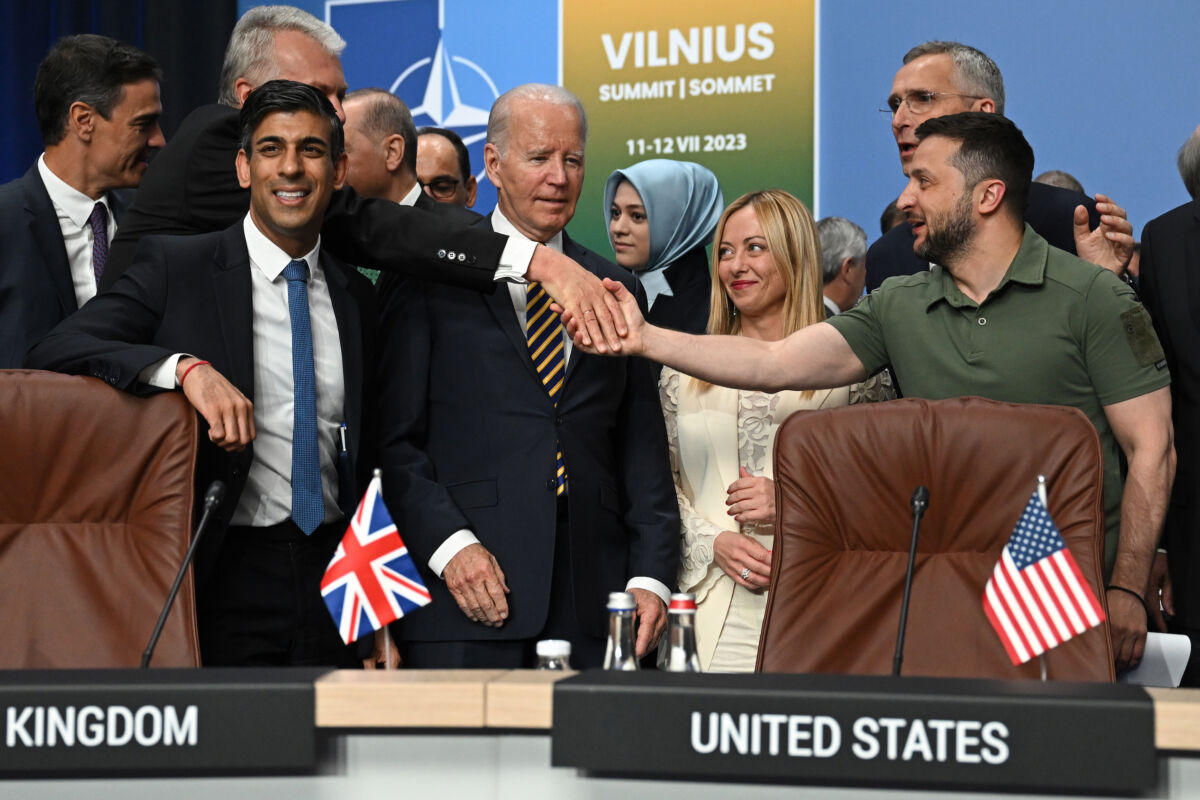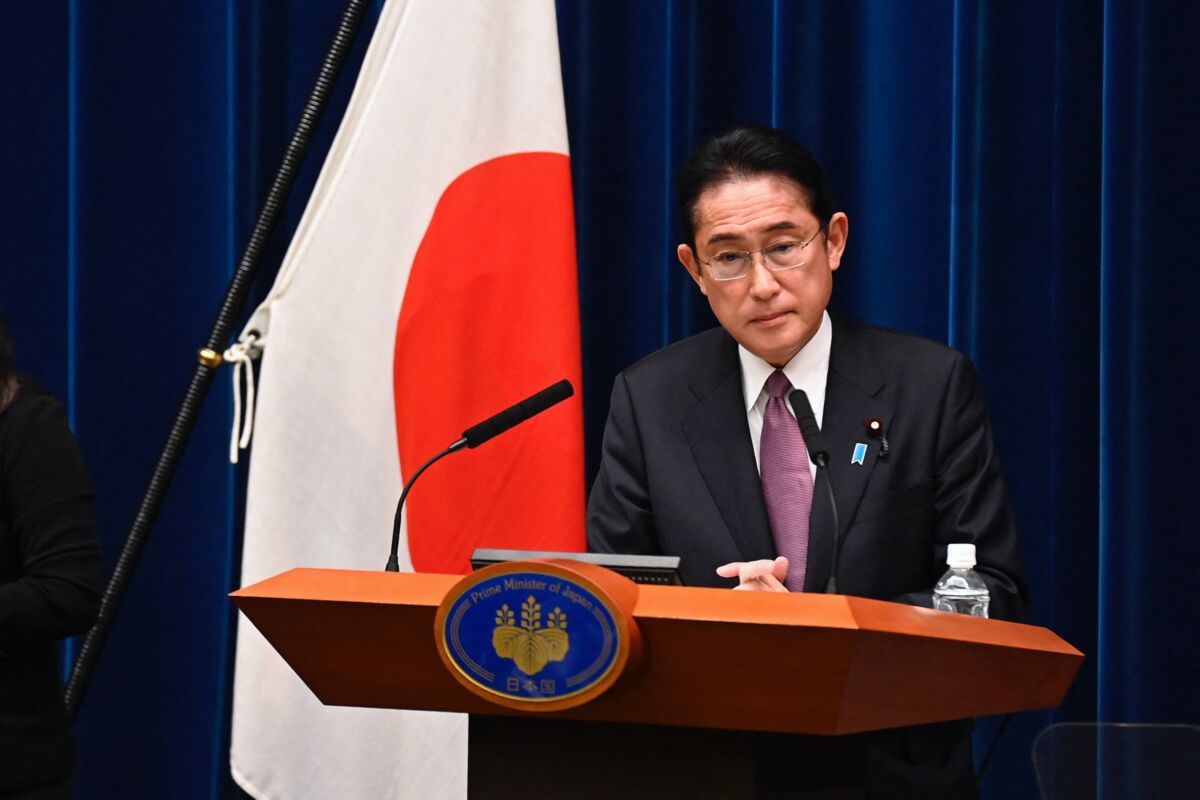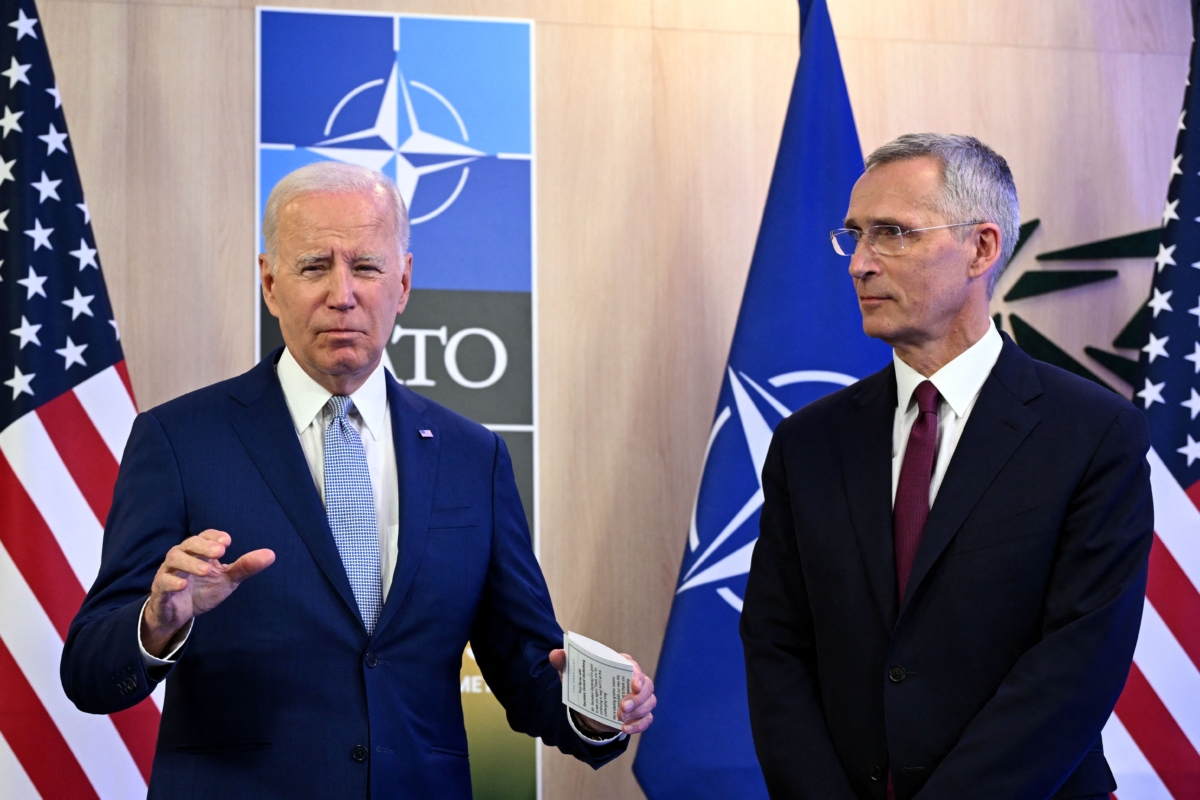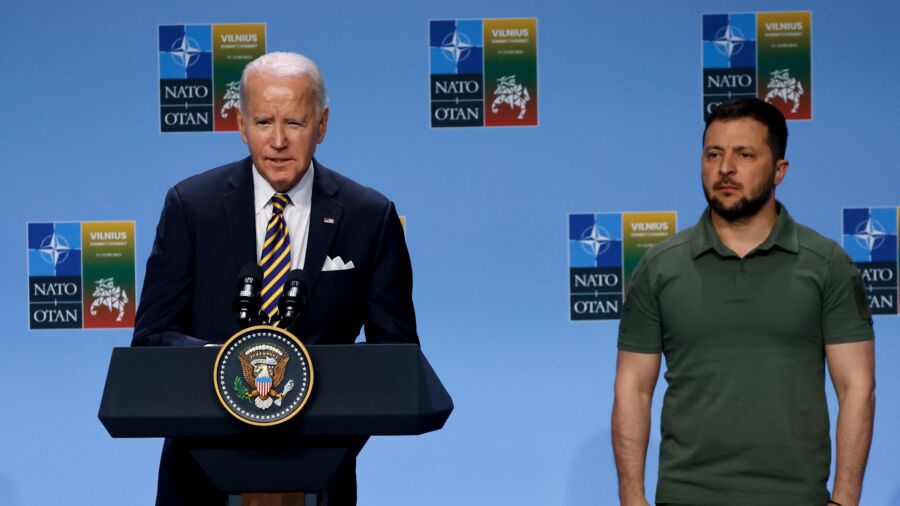A day after he called NATO leaders “absurd” for failing to clarify a timeline for Ukraine’s long-deliberated entry into the 32-nation alliance, Ukraine President Volodymyr Zelenskyy was far more upbeat on July 12 as NATO’s two-day summit in Lithuania neared its conclusion.
He may not have secured the big win—advancing Ukraine’s stalled 2008 request to join NATO—but Mr. Zelenskyy will be returning to Kyiv with many stocking stuffers, including security guarantees from Group of Seven (G7) nations and a seat at the newly formed NATO-Ukraine Council.
“The Ukrainian delegation is bringing home a significant security victory for … Ukraine, for our country, for our people, for our children,” Mr. Zelenskyy said during a press conference with U.S. President Joe Biden and Japan Prime Minister Fumio Kishida to introduce a Joint Declaration on Support for Ukraine signed by all G7 leaders.

“The outcome of the NATO Summit in Vilnius is very much needed and meaningful success for Ukraine,” he said at the Lithuanian Exhibition and Congress Centre in Vilnius.
“And I am grateful to all leaders in NATO countries for very practical and unprecedented support considering decades of our relations’ support for Ukraine.”
“Today, the members of the G7 are launching a Joint Declaration of Support for Ukraine to make it clear that our support will last long into the future,” Mr. Biden said. “This starts a process by which each of our nations and any other nation who wishes to participate will negotiate long-term bilateral security commitments with and to Ukraine.”
The G7 is an intergovernmental political forum consisting of Canada, France, Germany, Italy, Japan, the United Kingdom, and the United States.
In the 820-word declaration, the seven leaders “reaffirm our unwavering commitment to the strategic objective of a free, independent, democratic, and sovereign Ukraine, within its internationally recognized borders, capable of defending itself and deterring future aggression,” calling Ukraine’s security “integral to the security of the Euro-Atlantic region.”

The declaration outlines the start of “negotiations with Ukraine to formalize—through bilateral security commitments and arrangements aligned with this multilateral framework … our enduring support to Ukraine as it defends its sovereignty and territorial integrity, rebuilds its economy, protects its citizens, and pursues integration into the Euro-Atlantic community.
“We will direct our teams to begin these discussions immediately.”
The declaration describes what provisions G7 nations will offer and what responsibilities Ukraine assumes in accepting the assistance as it “pursues a pathway toward future membership in the Euro-Atlantic community.”
A key passage reads: “In the event of future Russian armed attack, we intend to immediately consult with Ukraine to determine appropriate next steps.
“We intend, in accordance with our respective legal and constitutional requirements, to provide Ukraine with swift and sustained security assistance, modern military equipment across land, sea, and air domains, and economic assistance, to impose economic and other costs on Russia, and to consult with Ukraine on its needs as it exercises its right of self-defense enshrined in Article 51 of the UN Charter.
“To this end, we will work with Ukraine on an enhanced package of security commitments and arrangements in case of future aggression to enable Ukraine to defend its territory and sovereignty.”
Japan Led The Way
“We’re going to help Ukraine build a strong, capable defense across land, air, and sea … it will be a force of stability in the region and deter … any and all threats,” Mr. Biden said, praising Mr. Kishida and Japanese government officials for spearheading the declaration.
“You know,” he said, “I think there are very few people in Europe, or in the continental United States, in the North American continent, that thought this man [Kishida] would stand up and come to the aid and assistance of Ukraine.”
Mr. Biden said under Mr. Kishida, Japan has increased its military budget and “stepped up” its coordination with nations that abide by the rule-based international order “because [Mr. Kishida] understood that when any part of the world has 185,000 people, soldiers crossing a border, stealing sovereignty from another nation, that it affects the whole world.”

Mr. Kishida said the foundation for the declaration was laid during May’s G7 Hiroshima Summit “that included a wide range of invited countries.”
“We agreed that unilateral attempts to change the status quo by force or coercion are unacceptable anywhere in the world and to safeguard a free and open international order based on the rule of law,” he said.
Mr. Kishida said while G7 leaders are the founding signatories, other nations can sign on as well.
“I hope many countries will choose to join,” he said. “The G7 will continue to stand by Ukraine. Our solidarity will never waver.”
New NATO-Ukraine Council Meets
Mr. Biden said the “first meeting of the NATO-Ukraine Council” had concluded before the press conference.
“All our allies agreed Ukraine’s future lies with NATO” and to “lift the requirements for the Membership Action Plan for Ukraine and to create a path to NATO membership while Ukraine continues to make progress on necessary reforms.”
But that could take time—maybe years, he said.
Therefore, Mr. Biden said, G7 nations offered the declaration as a security guarantee until Ukraine is formally admitted into the alliance.
“We’re not waiting for that process to be finished to make the long-term commitments that we’re making to Ukraine’s security,” he said. “Mr. Zelenskyy and I talked about the kind of guarantees we could make in the meantime.
“And so, today,” Mr. Biden continued, “the long-term commitments we’re making are backed up by the notion that in the meantime, we’re going to provide security to Ukraine for its needs and against any aggression that may occur.”
The day before, in a series of interviews and Twitter statements, Mr. Zelenskyy ripped into NATO leaders for not considering his nation’s 16-year application to join, claiming the decision—and indecision—by the alliance is “motivating” Russia.
“It’s unprecedented and absurd when [a] time frame is not set neither for the invitation nor for Ukraine’s membership. While at the same time vague wording about ‘conditions’ is added even for inviting Ukraine,” he said in a July 11 Twitter post.
But standing with Mr. Biden and Mr. Kishida the next day, Mr. Zelenskyy’s tune had changed.
“Today, there are security guarantees for Ukraine on the way to NATO—an important package of security guarantees,” he said.
“Today, we are coordinating with the G7 countries the framework for [the] security guarantee that shall be further extended through arrangements with our key partners, bilateral and multilateral agreements.
“It opens for us absolutely new security opportunities,” he added. “Slava Ukraini.”
“I think it’s a powerful statement—a powerful statement of our commitment to Ukraine as it defends its freedom today and as it rebuilds the future for—and we’re going to be there as long as that takes,” Mr. Biden said.
From The Epoch Times

